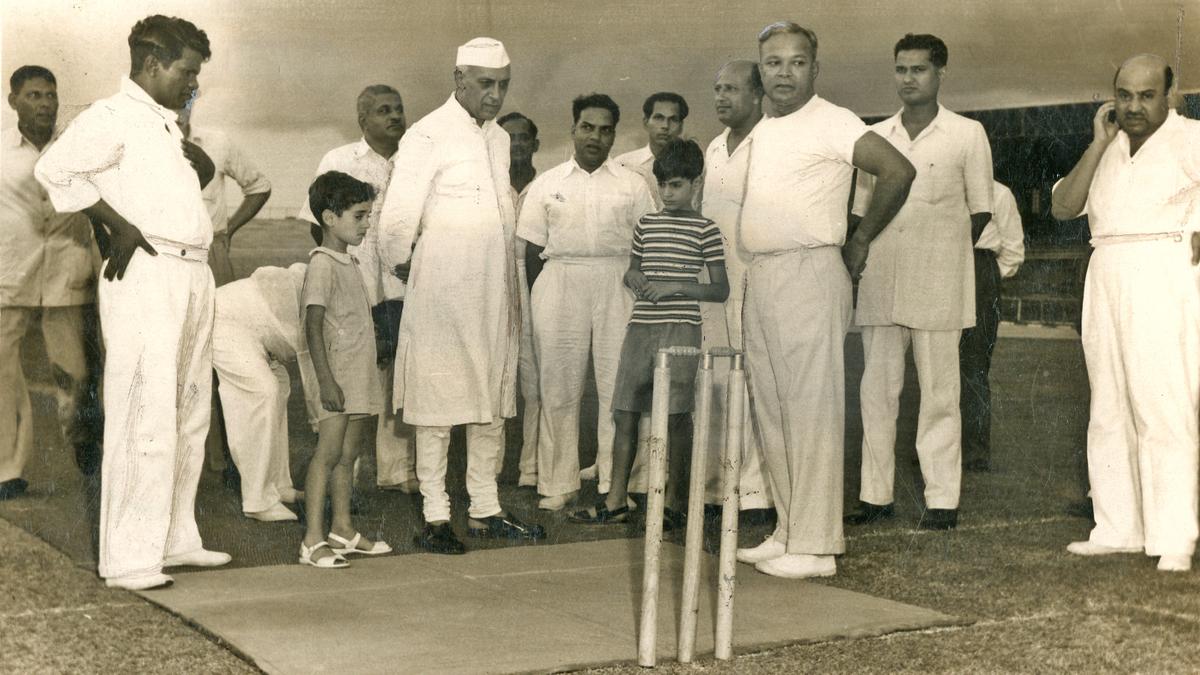
A match in Parliament: an excerpt from Lo Bir Sendra — A Hunter in the Burning Forest by Jaipal Singh
The Hindu
An excerpt from Lo Bir Sendra — A Hunter in the Burning Forest by Jaipal Singh
The Olympic winning hockey captain of the 1928 Amsterdam Games and a stalwart of the Adivasi movement organised several sporting events as a parliamentarian. In his memoir, Lo Bir Sendra: A Hunter in the Burning Forest, Jaipal Singh recalls setting up a cricket match for MPs. Jawaharlal Nehru, S. Radhakrishnan and a host of politicians took the field. The editors of the memoir note that it was written during a long sea voyage to Europe in 1969, a year before Singh’s death. It was first published by ‘Prabhat Khabar’ with a foreword by Stan Swamy, but soon went out of print. With its republication, a new generation of readers will learn of Singh’s life and times. An edited excerpt:
There were also occasions when sporting events had to be organised for MPs. The first one I took charge of happened in September 1953, in the wake of the floods that besieged Bihar, Andhra Pradesh and Uttar Pradesh. I found there were enough cricketers in Parliament, some of them top class, like the maharaja of Dungarpur and Sardar Surjit Singh Majithia. The Parliamentary Sports Club was formed with Nehru as chairman, the president of the republic as patron, and I, manager. I appointed the maharajadhiraj of Darbhanga as treasurer. Rajkumari Amrit Kaur was a keen member of the executive committee.
I decided that there should be a match between the Prime Minister’s XI and the Vice-President’s (Dr. Radhakrishnan). The press took all this as a joke to ridicule the MPs. I arranged net practice and gave press communiques. Special blazers and caps with the parliamentary badge were also issued for the participating players. Even the Prime Minister had to pay for his blazer and cap.
Characteristic ‘native’ problems cropped up. Kaka Gadgil, a Cabinet minister, insisted on playing in his dhoti. Gopalan, the communist leader, had never worn boots. Rajkumari Kaur and Begum Aizaz Rasul insisted on their inclusion. A deputation of Nehru’s admirers demanded he should not play. Although I had taken the decision without consulting anybody, Nehru wanted to play so I included him. No dhotis in cricket, I decided. I bought Bata shoes for Gopalan. I promised the women I would not leave them out if I couldn’t get twenty-two male players. I said they could even umpire.
The brochure was a big job. Anthony de Mello, fomer president of the Board of Control for Cricket in India, took charge of this task. I got a letter of support from the Prime Minister, and this got ‘Tony’ hundreds of advertisements. We made nearly ₹50,000 on this one item. Tony, who was also honorary general secretary of the National Sports Club of India, organised a Parliament-like seating arrangement in the National Stadium Gallery for distinguished visitors, the Speaker’s guests, in the officers’ box and the President’s box. Seating also had to be arranged for the players. Lala Sir Sri Ram, a big businessman, undertook to lunch us. Beer, I got free from Dyer Meakin.
Printing the tickets was also a problem. In Delhi, and perhaps elsewhere, it quickly becomes a money-making business, with black markets emerging almost immediately after tickets are printed. Tony connected me with one of his many stooges. Twenty-five thousand one-rupee tickets were printed for the hoi polloi. Then, ten- and five-rupee tickets for the Bhavnagar Pavilion. I arranged for one row of thousand-rupee tickets just behind the teams. Every ticket sold out. Maharajas were keen to sit near the Prime Minister. I had no difficulty with the twenty-five thousand one-rupee tickets. I gave them to P.L. Mehta, the Delhi police chief, and got ₹25,000!
The President, Dr. Rajendra Prasad, a great lover of sports, arrived by the front lane. I presented the two teams to him. Dr. Radhakrishnan put on the cricket cap for a change. The two captains had to go out to the field for the toss. Nehru, the Harrovian, inspected the pitch and Tony commentated on the ongoings. A gold sovereign donated by [Ramnath] Podar, the left-hand bowler, decided in Nehru’s favour. Majithia and M.K. Krishna thrashed the bowling. An Indian crowd is not interested in the finer points of cricket. They want boundaries. Majithia gave them the boundaries. The spectators weren’t really interested in cricket. They only wanted to see the national hero in action. I put him in with Gopalan, who had never played cricket in his life.

 Run 3 Space | Play Space Running Game
Run 3 Space | Play Space Running Game Traffic Jam 3D | Online Racing Game
Traffic Jam 3D | Online Racing Game Duck Hunt | Play Old Classic Game
Duck Hunt | Play Old Classic Game











